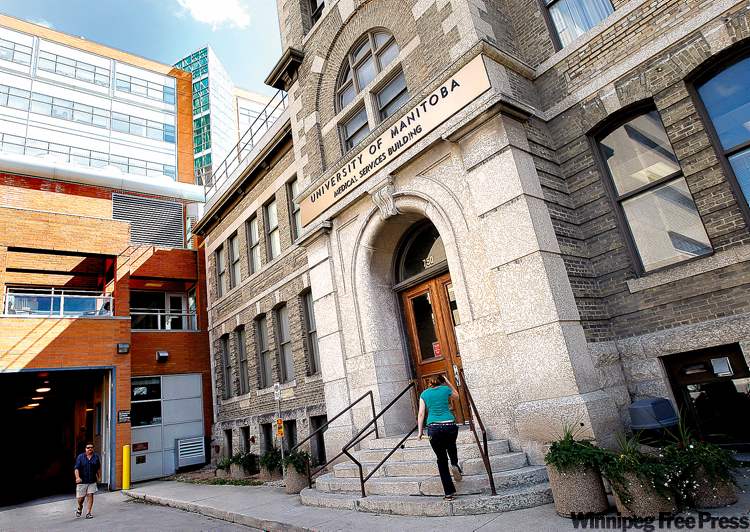Medical school training programs under scrutiny
One program shut down, five subject to review
Advertisement
Read this article for free:
or
Already have an account? Log in here »
To continue reading, please subscribe:
Monthly Digital Subscription
$0 for the first 4 weeks*
- Enjoy unlimited reading on winnipegfreepress.com
- Read the E-Edition, our digital replica newspaper
- Access News Break, our award-winning app
- Play interactive puzzles
*No charge for 4 weeks then price increases to the regular rate of $19.00 plus GST every four weeks. Offer available to new and qualified returning subscribers only. Cancel any time.
Monthly Digital Subscription
$4.75/week*
- Enjoy unlimited reading on winnipegfreepress.com
- Read the E-Edition, our digital replica newspaper
- Access News Break, our award-winning app
- Play interactive puzzles
*Billed as $19 plus GST every four weeks. Cancel any time.
To continue reading, please subscribe:
Add Free Press access to your Brandon Sun subscription for only an additional
$1 for the first 4 weeks*
*Your next subscription payment will increase by $1.00 and you will be charged $16.99 plus GST for four weeks. After four weeks, your payment will increase to $23.99 plus GST every four weeks.
Read unlimited articles for free today:
or
Already have an account? Log in here »
Hey there, time traveller!
This article was published 12/08/2010 (5575 days ago), so information in it may no longer be current.
One University of Manitoba medical training program has been shut down and five others are undergoing external review after outside experts found serious "weaknesses" and they failed to meet national standards.
U of M officials confirmed that special teams from the Royal College of Physicians and Surgeons of Canada will review resident training programs for pediatrics, adult hematology, obstetrics and gynecology, anatomic pathology and gynecological oncology in 2010. General surgery is also slated for an internal review this year.
The review comes two years after the programs received "provisional accreditation" from the Royal College and the College of Family Physicians of Canada. Accreditation teams met with residents and reviewed 43 of the U of M’s resident training programs in early 2008. They gave six programs that fell below standards provisional status. They also issued a notice of "intent to withdraw" accreditation from the university’s general pathology program.

General pathology was shut down in June 2009 after its final resident graduated.
"You have to remember that all of the remainder of our programs have full accreditation and there aren’t any broader issues," said Dr. Ira Ripstein, dean of postgraduate medical education.
"Even programs that are fully accredited may have some weaknesses that are left to improve on their own. We are always trying to improve our educational programs."
Medical graduates spend at least two years completing their residency training in hospital settings in order to get a licence to practise medicine, and those university-run programs must meet certain standards.
Ripstein said the U of M decided to discontinue general pathology prior to the accreditation survey because there weren’t any pathologists who were interested in teaching students.
He said the university stopped accepting new residents in general pathology after 2005, and the program ended after the final resident graduated. Ripstein said other universities across Canada have experienced similar problems finding pathologists to teach students, and the situation is not unique to Manitoba.
Ripstein refused to comment on what deficiencies led to the external reviews. In general, he said there are some things that the university needs "to fix.” Moreover, he said two of the biggest residency programs given provisional status — pediatrics and obstetrics and gynecology — have been recommended for full accreditation.
"This was a very good accreditation," Ripstein said. "It’s not a reflection that the residents in the training program are not adequately trained."
Anatomical pathology and gynecological oncology are slated for internal review in two years, though Ripstein would not elaborate further.
Margaret Kennedy, assistant director of accreditation with the Royal College, said residency programs given provisional accreditation have two years to address the problems before they submit an internal report to the college or are visited by external reviewers. She said external reviews are done when there are either persistent weaknesses in a program, a specialty-specific concern, or a "political" issue that prevents the university from completing an unbiased review.
In general, Kennedy said between 10 and 15 per cent of a university’s residency training programs are given provisional status following a survey visit. She said the majority of problems are resolved within the two-year period, and that residents who graduate from a training program with provisional status are just as competent as doctors trained elsewhere.
"If we felt that the weaknesses were that severe and the university was not addressing those weaknesses, the college would and could withdraw accreditation immediately," Kennedy said. "As far as I know, that hasn’t happened."
jen.skerritt@freepress.mb.ca
History
Updated on Thursday, August 12, 2010 10:35 AM CDT: Tweaks headline.

